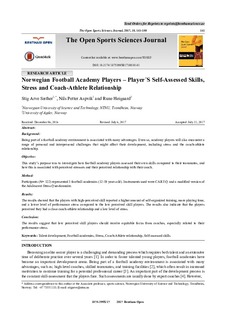Norwegian football academy players - Player's self-assessed skills, stress and coach-athlete relationship
Journal article, Peer reviewed
Published version
Permanent lenke
http://hdl.handle.net/11250/2471482Utgivelsesdato
2017Metadata
Vis full innførselSamlinger
Sammendrag
Background: Being part of a football academy environment is associated with many advantages. Even so, academy players will also encounter a range of personal and interpersonal challenges that might affect their development, including stress and the coach-athlete relationship. Objective: This study’s purpose was to investigate how football academy players assessed their own skills compared to their teammates, and how this is associated with perceived stressors and their perceived relationship with their coach. Method: Participants (N= 122) represented 3 football academies (12-19 years old). Instruments used were CART-Q and a modified version of the Adolescent Stress Questionnaire. Results: The results showed that the players with high-perceived skill reported a higher amount of self-organized training, more playing time, and a lower level of performance stress compared to the low perceived skill players. The results also indicate that the players perceived they had a close coach-athlete relationship and a low level of stress. Conclusion: The results suggest that low perceived skill players should receive equitable focus from coaches, especially related to their performance stress.

